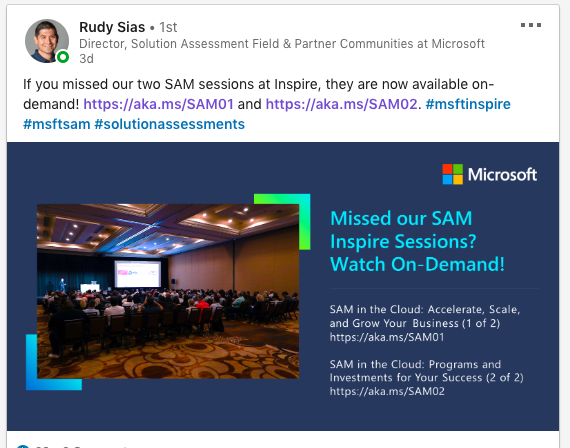Dear Microsoft, please stop abusing the word “SAM”
I met with Patama Chantaruck back in 2017, former global Microsoft SAM lead, who was honest enough to admit that Microsoft had confused their customers and partners, using the word SAM to represent soft audits and compliance reviews.
“…and it was clear she was well aware of how SAM has been mis-represented in the past. She hopes this new programme will “reduce that misunderstanding” and that “It’s us (Microsoft), it’s the partner, we really need to catch up in helping our customers perform SAM in the right way”. Source
It appears this mature outlook has been abandoned as Microsoft announce “$38M of incentives for the SAM Channel” at their Inspire partner conference.

Azure pre-sales is not SAM
“Cloud Migration is the goal, Solution Assessments is the brand”
During a session led by Rudy Sias, whose LinkedIn profile openly claims to “…drive strategy for adoption of cloud services for the SAM and Audit motions”, it was shared that during FY18/19, 290 partners were paid $28M in incentives to conduct 2,600 assessments.
To help hit growth in pre-sales assessments under the guise of SAM for this financial year, Microsoft has loosened the prerequisites for partners conducting assessments. So now any Silver or Gold partner with a pulse can play. Microsoft customers should prepare for unqualified partners claiming to offer SAM nirvana (As long as it results in cloud sales).
If you want to pay partners to conduct cloud pre-sales assessments, great! But let’s stop calling it “SAM”.
SAM is a business practice for managing assets throughout their lifecycle, it’s not a “sales play” for Azure. Real SAM would provide customers will a multitude of options, which might include sweating Microsoft for a little longer or building a multi-cloud strategy, it would not provide “Migration as the only outcome” as stated with these engagements.
Real SAM would reduce costs, mitigate risks, speed up transformation and provide increased security of the network. Real SAM involves lasting organisational change, habits changed, assets managed, business improved. Buying some Azure to cover up the cracks in sloppy processes is not SAM.
Microsoft, please stop abusing the word “SAM”. You are ruining the term for REAL partners delivering REAL SAM, you are dragging our industry backwards. You are poisoning the term SAM in end user organisations minds, confusing it with “Microsoft Audit” and “Sales exercise”.
SAM in the 2020s delivers considerable strategic advantage. As we try to grow the ITAM industry and the number of organisations participating, your interference is not helpful.
- Tags: 1_Microsoft_EP · Azure Pre-sales · Microsoft · SAM Assessments
About Martin Thompson
Martin is also the founder of ITAM Forum, a not-for-profit trade body for the ITAM industry created to raise the profile of the profession and bring an organisational certification to market. On a voluntary basis Martin is a contributor to ISO WG21 which develops the ITAM International Standard ISO/IEC 19770.
He is also the author of the book "Practical ITAM - The essential guide for IT Asset Managers", a book that describes how to get started and make a difference in the field of IT Asset Management. In addition, Martin developed the PITAM training course and certification.
Prior to founding the ITAM Review in 2008 Martin worked for Centennial Software (Ivanti), Silicon Graphics, CA Technologies and Computer 2000 (Tech Data).
When not working, Martin likes to Ski, Hike, Motorbike and spend time with his young family.
Connect with Martin on LinkedIn.

It is hard to imagine that any SAM professional would think a Microsoft “SAM Review” was anything other than an audit.
In 2016, Patama was here in Brazil, and she came up with the same speech.
Good point, Martin. Totally agree with you.
You are completely true Martin.
Some years ago Microsoft used SAM wording to do their audits and sell Enterrise agreements as the whole solution of any company compliance and adding any kind of unuseful things inside such agreements that made them costly and not useful for the target of real SAM.
Business Management just claimed “lets pay them and avoid all this issues with compliance, it is cheaper than drilling down into our installations…”
Now it’s time fo Azure… and SAM is again misunderstood.
Martin, interesting view. Let’s not forget that many (self proclaimed) SAM partners once started buiding their business (and still depend) on incentives from Microsoft. I dare to say that many partners would not even have existed or thrived today without msfts incentive program whether we like it or not. SAM is dead, long live SAM!
Jeroen, I agree that Microsoft incentives might have highlighted the market to some partners, but if partners in 2019 are dependent on incentives to prop up their SAM business they don’t have a viable business. So much more value to be delivered, credibility won and profit made by delivering services with the custpmer’s goals in mind.
This confirmed a story I heard concerning a meeting in TVP circa 12 months ago – “We’re really disappointed that SAM isn’t driving more new sales” – from a Microsoft Employee. This, though, isn’t new. Consider the old MCP Microsoft used to offer for SAM: recycling software was something you did as a last step; not a first step.
Thanks Martin, couldn’t agree more! Not only as to Microsoft but, more broadly, other publishers and solution providers that offer ‘SAM’ services/solutions that are actually focused on software license compliance (SLC), maybe optimization (SLO). SAM goes beyond licensing, additionally considering the software assets (products) – function, support, value/ROI, roadmap etc.